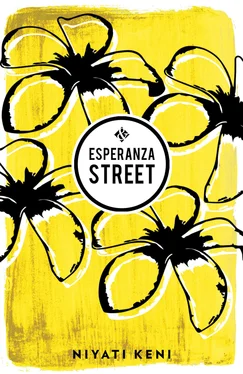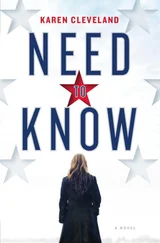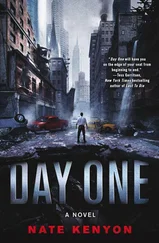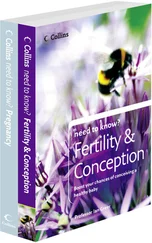Esperanza Street, October 1981
I stood at the boarding-house gate looking out over Esperanza Street. The rains had stopped now and the ground was dry. The garden behind me was lush with the green of fresh growth. At the top of the hill, towards Salinas Boulevard, Concepcion, one of the fish vendors, leaned forward on her stool. She rummaged for a while between the folds of her breasts before drawing out her tobacco tin. With her other hand she continued in her rhythm of sluicing the fish with water from a pail at her feet: lines of crab and milkfish and groupers. Nearby, the cycle rickshaw drivers fidgeted in the heat, fanning themselves with newspapers or their palms, pulling the visors of baseball caps low across their faces, settling back on their passenger seats as if asleep, feet up on the saddles.
Further down in the direction of the jetty, Abnor and Primo lounged in the doorway of Primo’s store and, across the road, Johnny Five Course swatted the flies away from his bottles of soy and fish sauce. He was doing good business. The boarding houses and inns of the neighbourhood were filling slowly with people from out of town. Architects, engineers, officials with briefcases. And every day more people arrived looking for labour.
At the bottom of the hill the market hall had been cleared of debris and the market was running again, but as a more subdued version of itself. At the jetty the boats were still arriving. Only now, like the haulage trucks full of bricks and steel and lengths of bamboo, many were laden with the materials that would change Esperanza forever.
There was to be a reprieve for the cemetery at least, Eddie Casama having little appetite for conflict with the dead as well as the living, it seemed. He was quoted by the newspapers describing it as a gift, a sign of his goodwill towards the inhabitants of Greenhills, or at least to those who might remain, for people had already started to move away, the first departures coming not long after the fire. A few days later, in the same newspapers, he announced his intention to stand in the coming year’s elections.
At the Bougainvillea, Dub was finally preparing to leave for college in Manila to study engineering, at his grand pater’s alma mater , he said. I smiled whenever I recalled him saying it because it still sounded funny, but at the time I didn’t know what it meant. I didn’t know then whether I’d see him when he returned, or whether he’d forget that I was ever a part of his life.
I’d moved the few things that were mine to my father’s apartment, including BabyLu’s books, though these still waited in their boxes for me to fix more shelves. Soon enough, I knew, the apartment would be gone, but until then we would make a life there. I spent every night there now, coming to the boarding house only occasionally to help Aunt Mary in the garden or to show the new houseboy how she liked things done, though she never asked it of me. Whenever I was there, I took a few minutes to linger, as today, at the gate. She and Dub had made enquiries for me and I’d started work at Earl’s garage. If I showed any aptitude, he would keep me on, but I was enjoying it already, and even learning how to ride a bike.
I was standing at the gate, my cheek against the cool part of the stone that lay under the shadow of the cheesewood hedge, when I heard him walk across the verandah and down the driveway towards me. I knew it was Benny without turning, knew by heart his footsteps and the sound of the bag, full of sketchbooks and papers, banging against his legs. He came over and stood next to me, his hands in his pockets, looking out as I did over the street. He leaned in close, trying to see it from my perspective. Already he was so much taller than me.
We stood for a while without speaking. Then he pulled some papers out of his bag and handed them to me. I looked down at them. They were bound together: a komik, unmistakeably his work. I opened them and started to read, but I didn’t get very far. My eyes clouded and I wiped them on my sleeve several times. But, Benny , I opened my mouth to say. Even if I had been able, at that moment, to find the right words with which to voice the truth, he would never have heard them. For he was already walking out of the gate, his long, loping stride carrying him up the hill towards Salinas. I closed the komik to read it later in my father’s apartment, my apartment. I ran my fingers softly over the cover. The Black Riders , Issue Number One: the story of a man protesting against the destruction of all that is familiar to him; the story of his courage at a fire, his death, his funeral and his son — a small man barely out of boyhood, quite handsome on the page at least — who goes on to become a hero.
I am indebted to the following people for providing practical support, critical feedback, and belief and encouragement during the writing and publication of Esperanza Street . In (almost) alphabetical order:
Jean Dowton, Vanessa Gebbie, Liat Hughes Joshi, Dnyan Keni, Caroline Maldonado, the late Archie Markham, Pippa McCarthy, John Milne (aka Tom Bowling), Zoe Rhodes, Carl Smith, Euan Thorneycroft, Martin Vaux. Also, particular thanks to my editor, Ana Fletcher, and the rest of the team at And Other Stories: Stefan Tobler, Sophie Lewis, Nicci Praça, Sarah Russo and Deborah Smith. Finally, thanks to the staff of the British Library.
Dear readers,
We rely on subscriptions from people like you to tell these other stories — the types of stories most publishers consider too risky to take on.
Our subscribers don’t just make the books physically happen. They also help us approach booksellers, because we can demonstrate that our books already have readers and fans. And they give us the security to publish in line with our values, which are collaborative, imaginative and ‘shamelessly literary’.
All of our subscribers:
receive a first-edition copy of each of the books they subscribe to
are thanked by name at the end of these books
are warmly invited to contribute to our plans and choice of future books Become a subscriber, or give a subscriptionto a friend
Visit andotherstories.org/subscribe to become part of an alternative approach to publishing.
Subscriptions are:
£20 for two books per year
£35 for four books per year
£50 for six books per year Other Ways to Get Involved
If you’d like to know about upcoming events and reading groups (our foreign-language reading groups help us choose books to publish, for example) you can:
join the mailing list at: andotherstories.org/join-us
follow us on Twitter: @andothertweets
join us on Facebook: facebook.com/AndOtherStoriesBooks
follow our blog: Ampersand
This book was made possible thanks to the support of:
Abigail Miller · Adam Lenson · Adrian May · Adriana Maldonado · Aidan Cottrell-Boyce · Ajay Sharma · Alan Cameron · Alan Ramsey · Alasdair Hutchison · Alastair Dickson · Alastair Gillespie · Alec Begley · Alex Martin · Alex Ramsey · Alex Robertson · Alex Sutcliffe · Alexandra Buchler · Alexandra de Scitivaux · Ali Conway · Ali Smith · Alice Brett · Alice Toulmin · Alison Bowyer · Alison Hughes · Alison Layland · Allison Graham · Alyse Ceirante · Amanda Anderson · Amanda Dalton · Amanda Love Darragh · Amanda Jane Stratton · Amber Dowell · Amelia Ashton · Amy Capelin · Amy McDonnell · Amy Rushton · Ana Amália Alves · Andrea Davis · Andrea Reinacher · Andrew Marston · Andrew McCafferty · Andrew Nairn · Andrew Whitelegg · Andy Burfield · Andy Chick · Angela Creed · Angela Thirlwell · Angus MacDonald · Ann McAllister · Ann Van Dyck · Anna Demming · Anna Holmwood · Anna Milsom · Anna Vinegrad · Anna-Maria Aurich · Annabel Hagg · Annalise Pippard · Anne Carus · Anne Maguire · Anne Meadows · Anne Waugh · Anne Marie Jackson · Anonymous · Anthony Quinn · Antonio de Swift · Antony Pearce · Aoife Boyd · Archie Davies · Asher Norris · Averill Buchanan
Читать дальше












